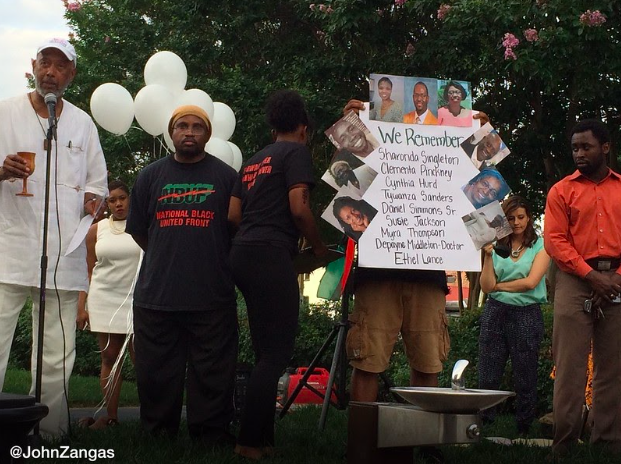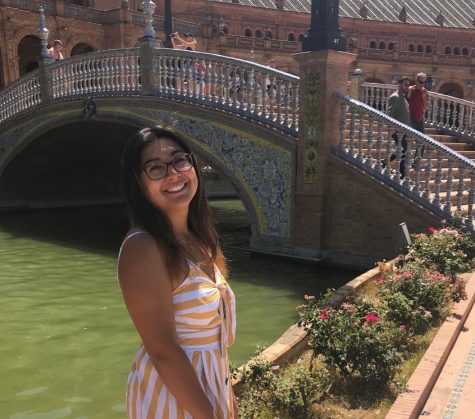Black forgiveness is not for white people
A vigil at the African American Civil War Memorial in Washington after the Charleston, South Carolina church shootings.
Oct 21, 2020
In his Broadway hit “Hamilton,” Lin-Manuel Miranda describes forgiveness as “a grace too powerful to name” in the song “It’s Quiet Uptown.” Despite the play not being anti-racist as a whole, I think Miranda is onto something with the concept of forgiveness. It defies every part of human nature. We have seen many miraculous instances of forgiveness from the Black community in the wake of devastating acts of police brutality and racial violence.
In 2013, we saw Trayvon Martin’s parents grapple with forgiving George Zimmerman. After the Charleston, South Carolina church massacre in 2015, we witnessed members of the victims’ families forgive shooter Dylan Roof. In 2018, we saw Brandt Jean embrace Amber Guyger, an ex-cop from Dallas who shot his unarmed brother, in an act of forgiveness during her trial.
Forgiveness is a cornerstone of Roman Catholicism and broader Christianity. In Matthew 18:21-35, Peter asks Jesus, “Lord, if my brother sins against me, how often must I forgive? As many as seven times?” Jesus replied, “I say to you, not seven times but seventy-seven times.” It is also embedded into the Lord’s Prayer: “Forgive us our trespasses, as we forgive those who trespass against us.”
Forgiveness is the example Jesus sets for us in the Bible. God has boundless mercy and will forgive all sinners who show repentance, which is liberating. There is nothing we could do that would transcend God’s all-encompassing forgiveness.
So, what does this mean for us, if we are taught to love others as God has loved us? It means we should forgive our parents for not always being a good example, our partners for not listening to us all the time and our friends for not hanging out with us enough.
These acts of forgiveness can be difficult enough on this digestible interpersonal level. Yet, there are greater evils in this world. Are we called to collectively forgive those who perpetuate homophobia, sexism and racism on a systemic level? What is God of asking us? Is he asking the African American community to forgive the white community for contributing to perpetual racial trauma, from slavery to police brutality? Surely, it cannot be that simple.
Author and civil rights activist Kevin Powell asks similar questions: “So I am raising this as a Christian and whose faith teaches love and forgiveness: how do we continually praise Black people for their capacity to endure and forgive, yet still refuse to have real and honest conversations about race and racism in America, about the need for the criminal justice system to be transformed completely, to be held accountable for its inequalities once and for all?”
We have seen countless examples of Black people willingly forgiving whites, but this is not their responsibility. We must stop burdening Black people with our white guilt.
“Yet while we continually forgive white America, no one has ever asked black America to forgive this country for its sins against us, including endless racial violence in these times,” Powell continued. “America should ask Black people forgiveness for habitually expecting us to forgive these murders, be it police brutality or racist vigilantes.”
These acts of forgiveness by African Americans do not mean that all the wrongs have been righted. In most cases, Black people are forgiving their white oppressors, not to assuage white guilt, but to initiate their own healing.
“I understand why a people who have experienced a history of racist traumas would seek healing and redemption through personal forgiveness,” explained Powell. “I empathize with what Botham Jean’s brother’s emotional and spiritual state might be, why he would fall back on his faith to cope, to try to make sense of it all.”
But, whites place themselves at the center of the conversation yet again, misinterpreting Black forgiveness as an excuse to forget the racist history of this country and negate the racism that persists today.
Breaking news: White people are not off the hook.
Forgiveness breeds forgetting, as the adage goes. Differentiating religious forgiveness from what she calls “racial forgiveness,” associate professor of Religion and Africana Studies Anthea Butler told The Guardian, “In a culture of ritual forgiveness and forgetfulness, no one is called to account for historic deeds done against others, and history is viewed as a malleable story to support the forgetting.”
Rather than washing our hands of racism in the face of Black forgiveness, white people are called to action — “to repent, atone, permanently change,” said Powell.
In her Litany for Those not Ready for Healing, Yolanda Pierce, Ph.D., lamented, “Let us not speak of reconciliation without speaking of reparations and restoration, or how we can repair the breach and how we can restore the loss.”
Read the rest of Pierce’s prayer here.













